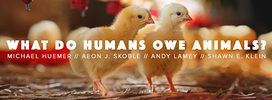I was surprised by the assertion that there is a broad shared consensus in this discussion. There is some agreement, for sure, but there are still sharp disagreements about the central question. There is agreement that animal cruelty is wrong, that there are practices in conventional food production that appear to cause unnecessary pain to the animals, and that to some extent we ought, if we can, to reduce such practices. But I disagree that these claims require vegetarianism or that the vast majority of people are immoral for eating meat.
As I argued in my reply, Huemer’s argument is not sound. Either some of his premises are false or the argument suffers from equivocation regarding “intrinsic badness.” But if we put that criticism aside, it still doesn’t follow that vegetarianism is a moral obligation or that it is immoral to eat meat.
His main claims can be summarized as:
- Conventional meat production uses many practices that are painful to animals.
- Causing unnecessary pain to animals is wrong.
All that follows from these claims is that we ought to work to reduce, if we can, the unnecessary painful practices. It might, as Huemer and Lamey seem to think, be impossible or exceedingly hard to reduce these sufficiently, and so a blanket ban on eating meat is required. But the existence of humane products belies this claim. It is more expensive, but that suggests that to some extent the pain in conventional production does not count as unnecessary pain. If we cannot reduce these practices in an affordable way, they are necessary to producing our food supply. So if one can afford humane products, they ought to try to go that way. But if they cannot, there is no such obligation.
Well maybe if producing humane meat is too expensive, we can just be vegetarians. It does appear to be the case that the vegetarian diet is cheaper than a meat-inclusive one. And that is certainly a legitimate reason to choose to be a vegetarian. This doesn’t, however, show that eating meat is immoral or that vegetarianism is a moral requirement. Furthermore, it is far from obvious that switching over to mass vegetarianism would be overall cheaper. There is an estimated 10-15% of the world’s population that currently lives on a vegetarian diet. So to replace the calories and nutrition of the meat-eating 85-90% means an enormous increase in the land, labor, and energy necessary to cultivate and produce a vegetarian diet. Feeding 700 million on a vegetarian diet is vastly different than feeding 7 billion. Given the massive change in scale, how much this will cost can’t just be extrapolated from what it takes to produce vegetables compared to producing meat today. And if mass vegetarianism turns out to be more expensive, it could lead to widespread harms such as increases in hunger, famine, and greater poverty.
Huemer also argues that vegetarianism is required because the benefits we get from eating meat are trivial. So the pain caused to animals in meat production is unnecessary since we don’t really need meat. From the perspective of what we seem to know about nutrition and health, this is for the most part probably true. Most people (though not all) can get their nutritional needs met on a vegetarian diet. But it doesn’t follow from this that the benefits from eating meat are trivial. A quick look at any human culture shows the immense importance of meals—and meat is frequently a major component of these meals. It is almost never a mere utilitarian task to acquire nutrition: it is at the core of many of the most important rituals and customs of almost every culture. This hardly, of course, makes the practice of meat eating right or acceptable, but it does mean that the benefit is more than merely some trivial “gastronomic pleasure.”
But, as both Huemer and Lamey ask, would we allow such benefits if they were derived from some process that harmed human babies? Of course not, but this begs the question. It assumes that how we treat human babies and cows or pigs ought to be the same. It is not an appeal to speciesism or some other arbitrary thing to recognize that human babies are quite different than the animals we eat. Lamey claims: “there are no principled grounds on which to assign sentient animals a lower moral status than merely sentient Homo sapiens.” But that’s false. Human babies are part of our moral and social context; they are born and live within the web of social and moral relationships that constitute society. Similarly with other so-called marginal human cases: it is not mere species membership that matters; it’s the nature of the relationships that can exist among humans. Such relationships are impossible with cows and pigs. They cannot from the kinds of relationships that constitute the human moral and social context. We can form attachments to these animals, but the nature of that relationship is different than the kind of relationships that can exist between humans. And as I suggested in my earlier essay, this gives us some reason to care about what happens to these animals and treat them well but it doesn’t generate the kind of obligations we have towards other people.
Huemer claims the overwhelming majority of people are acting immorally by eating meat. But this claim doesn’t follow from his argument. We can all agree that animal cruelty is wrong and that to some extent we ought to reduce or eliminate unnecessary painful practices in conventional food production. But that doesn’t entail vegetarianism and thus it doesn’t following that most of people are acting immorally by eating meat.

